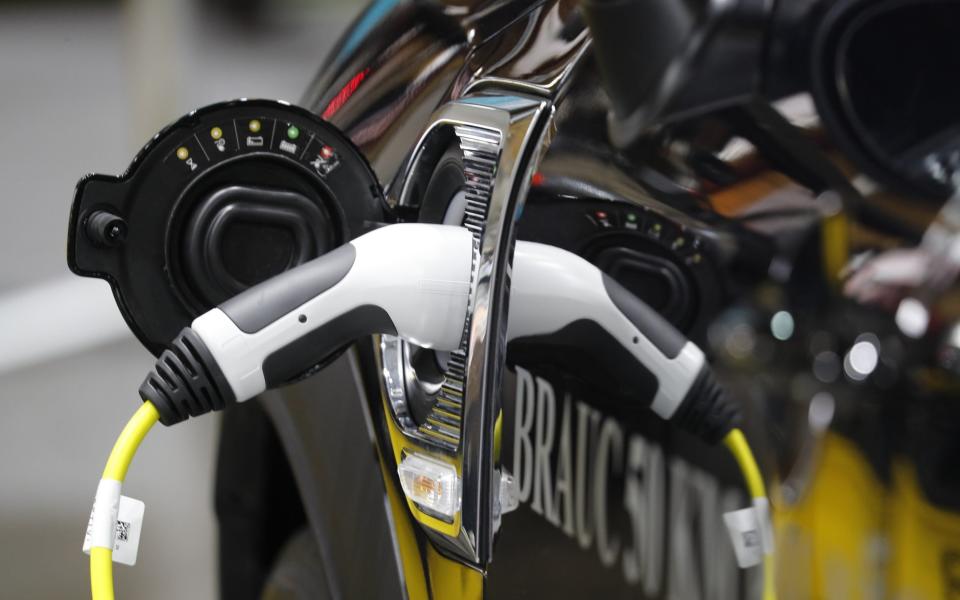Car makers bet on battery breakthrough in race to ditch fossil fuels

Chemicals giant Johnson Matthey said last week that it was abandoning its batteries business, putting an end to a £200m research project and, with it, one of the brighter hopes for a British-made electric car battery.
“It is a blow for the UK auto industry because it needs to pivot towards electric vehicles,” says Professor David Bailey, a car industry expert at Birmingham University.
“Johnson Matthey was seen as one of the forerunners of that and the UK is lagging behind in terms of building battery capacity.”
It is an industry dominated by a small number of names, none of which are British: China’s Contemporary Amperex Technology, Korea’s LG Chem and Japan’s Panasonic.
Britain has a few prospects such as Britishvolt, although its proposed factory is yet to be completed. Prof Bailey says that while the UK has fallen far behind in the global race to develop the batteries needed for mass electrification, it should still persevere with efforts to create a domestic industry rather than relying on imports.
“If we don't make batteries at scale, I don't think we'll have a mass car industry,” he says. Batteries are heavy to ship, and moving them in and out of the UK makes them targets for tariffs.
While battery costs are dropping, they still account for about 40pc of a car’s price, underlying its importance.
Currently at $150 per kilowatt hour, once battery storage falls to $100 per kilowatt hour, petrol and diesel cars will become uneconomic. This could happen as soon as 2025, which makes the need for battery manufacturing even more pressing.
Conversely, a strong uptick in demand may then push prices for the components up. But even if so, that could help in making some harder-to-reach sources of lithium - a critical component of most batteries - commercially viable to mine. Two companies are searching for lithium in Cornwall.
The “holy grail” for new battery technology is solid state batteries, which can provide much higher energy density with solid electrodes and electrolyte rather than liquid or gel.
Johnson Matthey signed a deal with Britishvolt and others in the summer to develop a solid state battery, and its members insist that the company’s withdrawal from its other project will not slow their programme down.
The Faraday Institution, the UK’s flagship battery research programme, said: “Johnson Matthey will remain a strong and committed partner to the Faraday Institution battery research and technology programme as it has done before. The solid-state battery consortium announced in August is focused on next generation batteries, specifically aiming to develop a prototype solid state battery.”
Britishvolt said: "We remain confident in the UK’s battery expertise and world-class ecosystem. BV is a very different business to JM. We are on track to deliver the UK’s first full-scale gigaplant and be a manufacturer of high-quality, ESG-mandated, low carbon, sustainable, battery cells.”
Research aside, Prof Bailey says that more government cash may be needed to get existing technology on track.
“I think in terms of the research and development side of batteries, the UK is very, very good. The issue is encouraging battery makers to actually invest in the UK to make batteries.”
The Government might consider copying the French and sponsoring a joint venture, as they have between oil firm Total and car maker Stellantis. “Whether the UK would be that interventionist, even post-pandemic, I'm not sure,” Bailey says.
Big car makers like Nissan, with its plant in Sunderland, or Honda, in Swindon, could opt to bring battery production in-house, which could solve the problem. Smaller domestic producers, however, would be left in the cold.
There are other areas of opportunity for innovation, none the less.
Electric car batteries could boost their range by up to 10pc using technology developed by a British software start-up after the company raised $11m from investors.
Warwick-based Eatron, founded by former car industry workers, is in early-stage tests with car companies who use its technology to manage performance.
The company is seeking to modernise the software in cars which is used to adjust elements such as suspension systems and power distribution. Founder Umut Genc says this could mean longer-lasting batteries.
Genc says Eatron’s software uses techniques such as machine learning to detect driving patterns, meaning that a battery might be managed in different ways in different cities. This could mean older batteries lasting between 5pc and 10pc longer.
“Range is the number one problem for electric car acceptance, and it's a real problem. We can learn how you drive. And we can then improve the range, as well as the life of the battery pack.”
The UK is not short of clever innovations, but if its battery industry is going to catch up with those of rival countries it will need more than one bright spark.

 Yahoo Finance
Yahoo Finance 